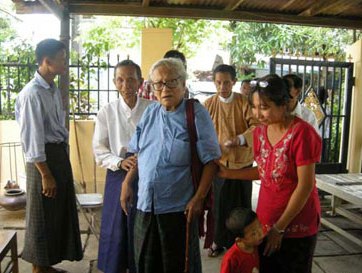Burma began offering visas to arriving tourists in May to lift tourism. But the scheme will be suspended on 1 September, a government official told Reuters.
Real reason – reporters and monitors
The parliamentary poll which will take place at 7 November this year,  the first nationwide elections since 1991, are widely dismissed by critics as an elaborate charade aimed at cementing the army’s grip on power and attracting investment.
the first nationwide elections since 1991, are widely dismissed by critics as an elaborate charade aimed at cementing the army’s grip on power and attracting investment.
“We think the real motive for this measure could be to prevent outside reporters and monitors from entering the country ahead of the upcoming elections,” a private tour operator said to the news agency.
Foreigners accompanied by minders
Total tourism arrivals in Myanmar during the fiscal year 2009-2010 stood at 300,000, up from 255,288 a year earlier.
Many foreign journalists traveled to the country on tourist visas during a monk-led political protest in 2007 and when Cyclone Nargis hit in 2008. The regime offers few opportunities for foreign observers to visit the country. Journalists and observers granted official visas are accompanied by minders.
The Association of South East Asian Nations has offered to send regional observers to Burma during the elections but there has been no official response thus far.
Last week, Burmese authorities published opaquely-worded rules that imposed tight controls on political campaigning.
New ruling party
Analysts say the regime plans to retain its political stake by backing several small parties and one large organisation, the Union Solidarity and Development Party (USDP), which is made up of serving ministers recently retired from the army.
Critics expect the ruling generals to tig htly control campaign activities of their opponents to ensure its proxies win most votes so the assemblies, of which 25 percent will be reserved for the armed forces, will be dominated by their allies.
htly control campaign activities of their opponents to ensure its proxies win most votes so the assemblies, of which 25 percent will be reserved for the armed forces, will be dominated by their allies.
Boycott announced
Meanwhile Burma’s main opposition party, the National League for Democracy (NLD), which won Parlaiment elections in Burma in 1991, announced on 20 August an official boycott of the election.
NLD said the party would encourage the exercise of voters’ right of free choice over voting as stipulated in the Union Election Commission Law, released in March this year.
“We decided to boycott this election as the 2008 Constitution and the 2010 electoral laws will not lead to the restoration of democracy and human rights in Burma”, party spokesman Ohn Kyaing said.
HRH Oslo, based on article by Ambika Ahuj (edited by Jason Szep and Sanjeev Miglani) Reuters and Mizzima information.
Relaetd links:
Burma: a wave of dissent-activists start campaign opposing elections





